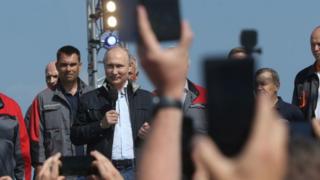Study Maps 'extensive Russian GPS Spoofing'

 Image copyright
Getty Images
Image copyright
Getty Images
Russian President Vladimir Putin has a bubble of spoofed GPS signals projected around him when he visits sensitive locations, a study suggests.
It involves the state using strong radio signals to drown out reliable navigation data, says non-profit C4ADS.
The report by the think tank documents almost 10,000 separate GPS spoofing incidents conducted by Russia.
Most incidents affected ships, said C4ADS, but spoofing was also seen around airports and other locations.
C4ADS, or the Centre for Advanced Defence, is a research organisation that uses sophisticated data analysis techniques to investigate global security and conflict issues.
Its report drew on more than 12 months of work analysing Global Navigation Satellite Systems (GNSS) positioning data taken from several sources. These included:
- automatic route logging systems on ships
- low-earth satellite signals
- route histories taken from users of the Strava exercise app
- public reports of vessels, aircraft and vehicles going off course
The analysis showed Russia was "pioneering" the use of GPS spoofing techniques to "protect and promote its strategic interests", the report said.
Generally, said the research group, the spoofing was being done to deflect commercial drones from entering sensitive airspace.
The spoofing was concentrated around 10 key locations including the Crimea, Syria, as well as ports and airports in Russia.
How does the spoofing work?
It involves flooding an area with radio signals that mimic those sent by global GPS satellites. These ground-based signals are much stronger than those sent from satellites so the real information is crowded out.
Around 1,311 ships passing through Russian waters had to correct their courses because GPS signals were being spoofed and were unreliable, said the report.
Ships generally had several sources of navigation information, it added, so could get back on their correct path once they noticed they were headed off course.
Putin's Crimea visit
The report also revealed that the spoofing was regularly used when senior government figures were out and about.
C4ADS said there was a "a close correlation between movements of the Russian head of state and GNSS spoofing events".
One of the best known situations when navigational data was seen to go haywire was when Mr Putin visited the Kerch Strait Bridge in Crimea in 2018, said the report.
The study concluded that spoofing was only likely to become more widespread as the equipment needed to generate the fake GPS signals was now so cheap.
"Whether for profit, protection, or disruption, illicit actors, writ large, stand to gain from the proliferation of these capabilities," it said.
John Dunn, writing on the blog of security company Sophos, said the developments logged by C4ADS were "alarming".
He added: "The good news is that it's not that hard to detect spoofing with the right technology, nor work out who might be doing it."
From Chip War To Cloud War: The Next Frontier In Global Tech Competition
The global chip war, characterized by intense competition among nations and corporations for supremacy in semiconductor ... Read more
The High Stakes Of Tech Regulation: Security Risks And Market Dynamics
The influence of tech giants in the global economy continues to grow, raising crucial questions about how to balance sec... Read more
The Tyranny Of Instagram Interiors: Why It's Time To Break Free From Algorithm-Driven Aesthetics
Instagram has become a dominant force in shaping interior design trends, offering a seemingly endless stream of inspirat... Read more
The Data Crunch In AI: Strategies For Sustainability
Exploring solutions to the imminent exhaustion of internet data for AI training.As the artificial intelligence (AI) indu... Read more
Google Abandons Four-Year Effort To Remove Cookies From Chrome Browser
After four years of dedicated effort, Google has decided to abandon its plan to remove third-party cookies from its Chro... Read more
LinkedIn Embraces AI And Gamification To Drive User Engagement And Revenue
In an effort to tackle slowing revenue growth and enhance user engagement, LinkedIn is turning to artificial intelligenc... Read more

